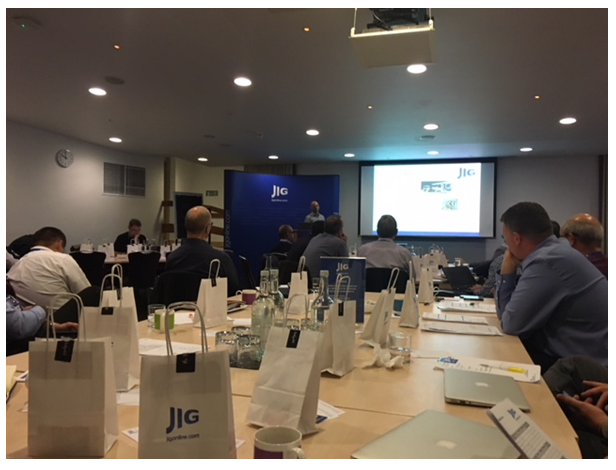 Last week John attended the latest JIG Technical Forum held at the Lensbury Conference Centre in Teddington. JIG (Joint Inspection Group) was started in the 1970’s by a number of oil companies that wanted to develop a set of standards to govern the operation of shared fuel storage facilities at the major airports around the world.
Last week John attended the latest JIG Technical Forum held at the Lensbury Conference Centre in Teddington. JIG (Joint Inspection Group) was started in the 1970’s by a number of oil companies that wanted to develop a set of standards to govern the operation of shared fuel storage facilities at the major airports around the world.
“The Vision of JIG is to be the leading internationally recognised forum where experts in all aspects of the aviation fuel supply industry can come together to establish and enhance standards for the safe handling and quality control of aviation fuels globally, and that those standards are recognised and endorsed by all parties with a stake in the industry.”

As well as producing standards around In-to Plane Fuelling and Aviation Fuel Quality, JIG has also developed an annual inspection system, and members of the eJet team are accredited to Inspect airport fuel storage facilities to JIG standards. There are approximately 180 airports worldwide where JIG standards are applied, including: Heathrow, Singapore and Hong Kong.
 eJet International has been a member of JIG since 2016 and has attended several such Technical Forums over that time.
eJet International has been a member of JIG since 2016 and has attended several such Technical Forums over that time.
John enjoyed meeting colleagues and peers from the industry and listening to the papers presented. Amongst a full agenda, some very interesting research findings regarding greases in fuel-handling swivels were presented by ExxonMobil, and Esterer showcased battery-powered pumps onboard fuellers. John found the whole event extremely beneficial. His key takeaways were:
-Battery-powered vehicles have a place in the aviation fuel industry, and whilst full battery-power – or even hybrid power – for large vehicles is still some way off, reducing emissions by not running fuelling vehicle engines whilst fuelling aircraft is a positive move – always provided that engine starting for emergency escape is reliable.
-Fuel contamination from extraneous sources is always a concern, and greases in swivels (e.g. floating suction swivels) are a necessary evil. To date, there has been little guidance on what greases or lubricants may be used (except that generic petroleum jelly is acceptable). With the research information presented, clearer guidance is now available.
Back to Latest News